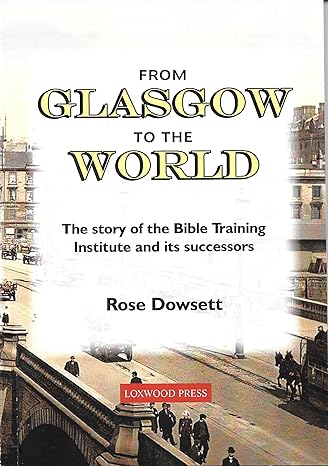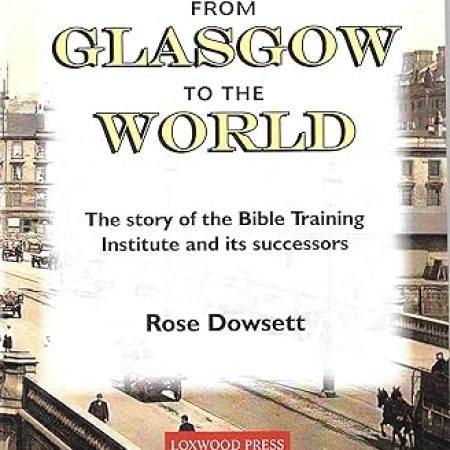
When I recently discovered that a book tracing the history and influence of the Bible Training Institute in Glasgow had been published, I was delighted and quickly bought a copy for myself. I had the immense privilege of studying at the BTI between 1978 and 1981 and cannot tell you what a blessing it was. Spiritually speaking, these were without doubt the most formative years of my life and, in the Lord’s goodness, I couldn’t have had a better preparation for ministry which I have now been involved in for more than 40 years. Studying under such spiritual giants as Geoffrey Grogan and Sinclair Ferguson, to mention just two made me the person I am today and the debt I owe the BTI is immense.
Perhaps then you will appreciate something of my disappoint when I read Rose Dowsett’s book; not so much because of what she said but rather what she doesn’t say, as well as the quality of the book itself.
For those unfamiliar with the BTI – “Best Training Imaginable”, as Principal Grogan used to say – it was one of the very first Bible Colleges in the UK, focussing as much on spiritual formation and preparation as on academic learning. Its influence in terms of the many hundreds who went from there to almost every corner of the globe, engaged in some form of ministry, is incalculable. Its origins lay in the ministry of Moody and Sankey who held evangelistic campaigns in Glasgow between 1874 and 1891. After going through a couple of ‘re-inventions’ of itself, and having merged with Northumbria Bible College along the way, what had become International Christian College, closed its doors for the last time in 2015.
I greatly enjoyed reading this account, filling in some gaps in my personal knowledge and reminiscing over names and events that were familiar to me. But there are at least two major – and I do mean major – problems with this book.
First, the production itself. Published by Loxwood Press, of whom, I confess, I have never heard before, the quality is very poor. There’s one place, towards the end of the book, where there is a break mid-paragraph, with the rest of the page, about two thirds of it, being left blank and the paragraph resumes on the following page. That’s just sloppy and amateurish. The quality of some of the photos is dreadful. I have several much better pictures, for example, of Dr Grogan, in my own collection than the only one in the book that appears on p93. And for all of this, in a paperback book of just 128 pages, the price is £14! Sorry, but that is exorbitant.
My other main problem with this book is, in many ways, much more serious, because it addresses not what Rose Dowsett says, so much as what she doesn’t say. The author who served on the staff of the College for a good number of years attributes the closure to a range of external factors that affected the College, factors such as the availability of free student tuition funding at universities in Scotland with very limited availability of such funding funding for Scottish students at ICC, and independent colleges in the rest of the UK and Ireland being able to offer full student loan funding to students.
I have no doubt that these issues and others played a part in the eventual demise of this great ministry, but I don’t believe they were the most significant ones. The real problem, in my opinion and that of many others I know of, was a gradual theological compromise that tragically ate away at the great spiritual heritage of the BTI.
Many of us who held BTI dear were aghast when the then Principal, Dr Tony Sargent, a personal friend of mine, invited Brian McLaren to speak at the College; a man synonymous at the time with the emerging church movement which had a very inadequate view of the authority and inspiration of Scripture, among many other serious flaws. Then, Richard Tiplady became the next Principal; a man who, at a missionary conference I was chairing, said that the correct response to the post-modern movement and it’s scepticism about Scripture should be, and I quote, “go with the flow”, and stated that there is no irreducible minimum of the gospel; all to the great consternation and concern of so many in the room at the time.
In the earlier part of her book, Rose Dowsett comments on how the BTI held a strong position and didn’t capitulate when liberal influences were affecting the church at large, and yet the direction in which Sargent and Tiplady took the College is not even commented on, never mind singled out as, at the very least, a contributing cause of the College’s closure.
I could mention the compromise that was involved when the College gained accreditation from Aberdeen University; a compromise that the late Peter Maiden, a former chairman of the College, told me, and I quote, “wasn’t worth it”. I could mention the supposed Masters in Expository Preaching which turned out to be a course heavily slanted towards a higher criticism view of Scripture; a course for which I, and a number of other serving Pastors signed up for but withdrew from very quickly when the real nature of the course became clear.
As Sinclair Ferguson, a former lecturer at BTI, has rightly said, “The decay of the church is never the fault of the world. Inward spiritual decline always precedes outward collapse.” That could so easily be the epitaph of the once great BTI. Other Colleges have refused to compromise, have found other ways to deal with the changes regarding funding and have survived – and I speak from personal experience – so the blame lies not at the door of the world but in the heart of the College.
Church history has repeatedly and clearly proven one thing: once the highest view of Scripture is abandoned by any theologian, group, denomination or church, the downhill slide in both its theology and practice is inevitable.
James White
Loxwood Press (20 December 2022) Review written in 2023
